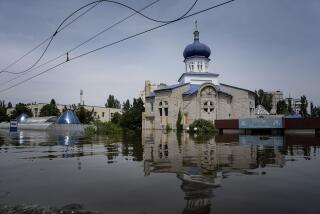U.N. General Warns of Serb-Croat Blood Bath : Balkans: Peacekeepers have lost credibility, lack power to avert tragedy on new front, commander says.
- Share via
ZAGREB, Croatia — The commander of U.N. peacekeeping forces in the former Yugoslav republics warned Thursday that Serbs and Croats are engaged in a deadly showdown and that his troops, having lost credibility with the combatants, are powerless to avert a looming blood bath.
As Lt. Gen. Satish Nambiar of India confessed to “fear greatly for the future,” the dueling between the heavy artillery of Croatian government troops and rebel Serbs spread to a new front in southern Croatia, in a fierce battle for a booby-trapped hydroelectric dam.
About 50 U.N. peacekeepers who had been patrolling the Peruca dam and its hydroelectric complex were ordered to retreat “because fighting around the area has been extremely violent,” U.N. spokeswoman Shannon Boyd said.
Serbian rebels seized Peruca, the main source of power for southern Croatia, during the six-month war in Croatia in 1991 and set mines at its foundations to deter Croatian efforts to retake it. Most of the tens of thousands of civilians living downstream from the 215-foot structure are Croats.
The Serbian-run Tanjug news agency in Belgrade reported that a shell fired by Croatian forces had already knocked out one sluice gate at the dam. But a Croatian government letter to Nambiar claimed that Serbian fighters had damaged the facility by blowing up a connecting bridge. The letter, signed by Deputy Prime Minister Ivan Milas, warned of “inconceivable ecological and human catastrophe” if the dam should give way.
Croatian sources later reported that they had captured the dam and said Serbs had damaged a sluice gate by setting off explosives.
The battle at Peruca means that the latest eruption of war has leaped to an area 40 miles away from any other continuing fighting.
“I’m afraid it’s a very grim situation,” said Nambiar, who has tended toward optimistic overstatement during the past nine months of U.N. intervention in Croatia.
Steady escalation of the fighting in Croatia’s Serbian-occupied Krajina region has deflated U.N. expectations that the armed and angry Balkan rivals can be compelled to listen to reason, spurring dire predictions of impending disaster.
Nambiar described Serbian and Croatian factions as being “poles apart” and hostile toward Western efforts to intervene.
“This has been an immensely rash and ill-advised action. It could have destructive consequences which we have not yet witnessed,” Nambiar said of the Croatian government’s offensive to recapture Serbian-occupied territory that began a week ago and rekindled fierce battles in U.N.-patrolled areas.
Although he condemned Zagreb’s resort to violence, Nambiar said he could not criticize the Croatian leadership for losing patience with a U.N. mission that has been repeatedly thwarted by the rebels.
“The Serbs of Krajina have often behaved in an exasperating way, failing to comply with agreements they made, failing to cooperate fully with UNPROFOR,” Nambiar said, referring to the U.N. Protection Force, the largest peacekeeping deployment in U.N. history, now nearing 25,000 troops.
The peacekeepers “have lost credibility in many ways” with all sides in the Balkan conflict, Nambiar said. He noted Croatian anger with the United Nations because of the peacekeepers’ failure to restore security to Krajina so that expelled Croats could return to their homes. He added that Serbian rebels are now angry with the United Nations because its troops had impounded some of their heavy weapons, leaving them vulnerable to the Croatian attack.
Since the Croatian offensive began, Serbian guerrillas have raided U.N. warehouses and redeployed the tanks and artillery pieces.
Nambiar did not mention it, but Bosnia’s Muslim Slavs are also furious with the peacekeepers for failing to protect a deputy prime minister who was assassinated in Sarajevo by a Serbian gunman earlier this month even as he was supposedly under the protection of French U.N. troops.
Fighting between Serbs and Croats now flares across an 80-mile arc from the Adriatic port of Zadar to the Peruca dam, just north of the city of Sinj, with forces reported to be massing on both sides of the confrontation line.
While Croatia has flouted U.N. orders to withdraw from Krajina, Serbia has also defied U.N. authority by thrusting through a Danube River naval blockade imposed to punish those accused of fomenting the Balkan conflicts.
Serbian-piloted barges carrying smuggled oil forced their way past Romanian and Bulgarian vessels by threatening to blow up their cargo if halted by the blockade monitors. Two of the barges have already reached Serbian waters.
Belgrade’s staunchly nationalist leadership has been slapped with harsh U.N. economic sanctions for arming Serbian militants in both Croatia and Bosnia-Herzegovina and directing their deadly campaigns to conquer territory for a “Greater Serbia.”
Renewed clashes were reported in central Bosnia despite the announcement Wednesday that Bosnian government troops and Croatian forces had agreed to a truce after weeks of fighting near the town of Gornji Vakuf.
The widespread breakdown of international authority in the region has been evident at the Geneva peace talks, where mediators Cyrus R. Vance of the United Nations and Lord Owen of the European Community complained of deadlock over their proposal to divide Bosnia into 10 bizarrely configured provinces.
Bosnian President Alija Izetbegovic has accused Vance and Owen of caving in to Serbian demands and legitimizing their reviled practice of “ethnic cleansing.”
The brutal 10-month Serbian siege of Bosnia has driven 2 million civilians from their homes and killed at least 20,000.
More to Read
Sign up for Essential California
The most important California stories and recommendations in your inbox every morning.
You may occasionally receive promotional content from the Los Angeles Times.














